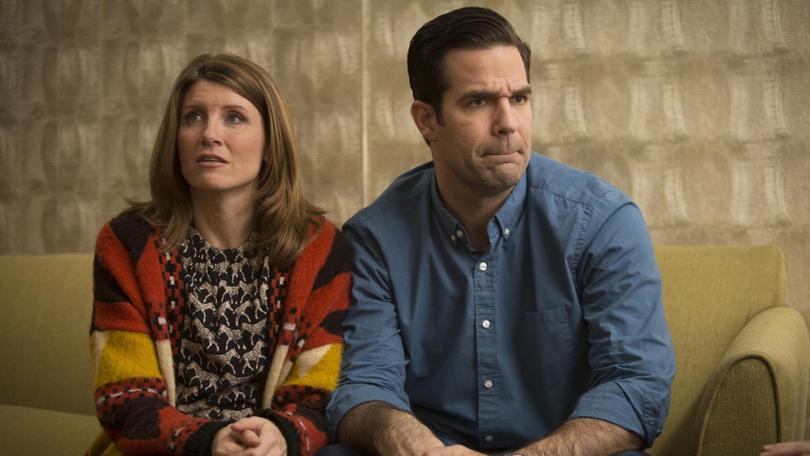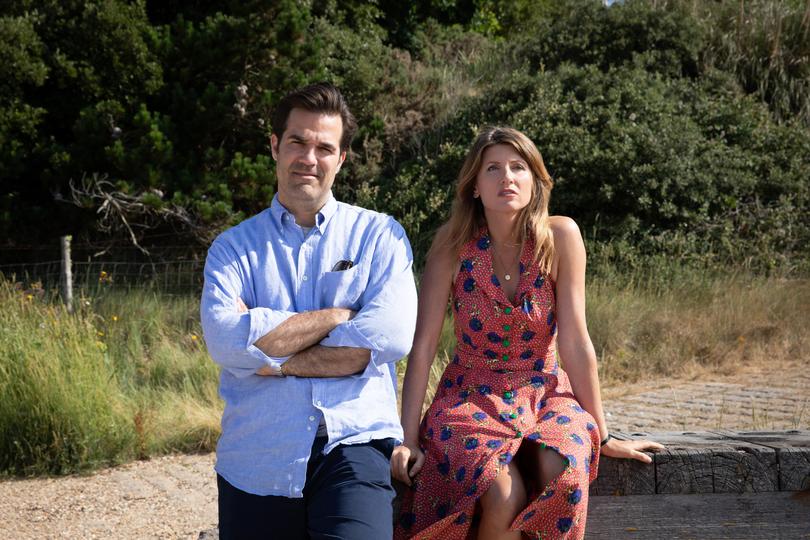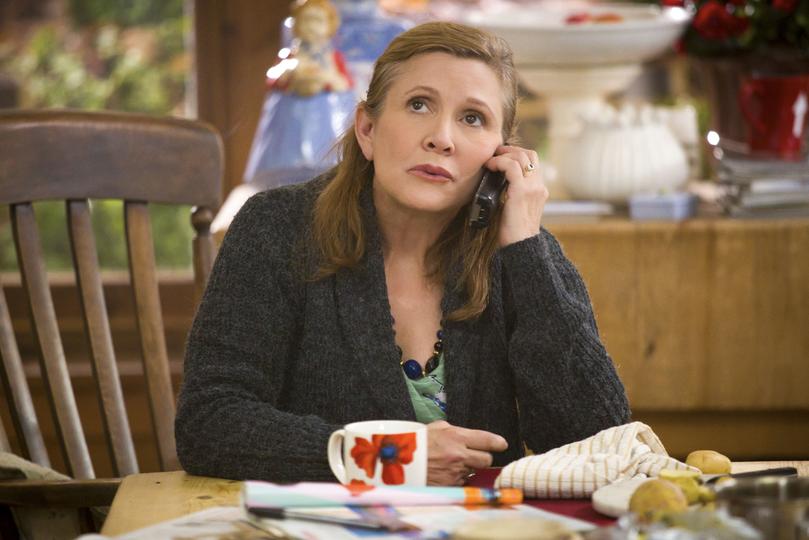Catastrophe: 10 years on, biting comedy still reigns as one of the best
It’s been 10 years since Catastrophe first hit our screens and a decade on, it is still one of the best.

As far as meet-cutes go, the one that kicks off Catastrophe isn’t particular groundbreaking.
Rob, an American adman, meets Sharon, an Irish teacher, in a bar in London. The two hit it off and decamp to his hotel room. Over the next week, they meet several times and have lots of sex. He flies back to Boston.
Three months later, his phone rings and up pops “Sharon (London sex)”. She’s pregnant. They decide to make it work and go from relative strangers to two people whose lives become almost completely enmeshed.
Sign up to The Nightly's newsletters.
Get the first look at the digital newspaper, curated daily stories and breaking headlines delivered to your inbox.
By continuing you agree to our Terms and Privacy Policy.It might be a relatively prosaic start but Catastrophe remains one of the best and under-watched rom-coms of the 2010s if not one of the most accomplished series of this century.
Bitingly funny and genuinely emotional, the series created and written by Sharon Horgan and Rob Delaney ran for four seasons and traversed everything from the mundanity of living with another person to grief, loss and alcoholism.

What made it distinct from the merry-go-round of “life happens” TV shows is the sharpness of the writing. The dialogue crackles with acerbic wit, with every character capable of truly cutting insults.
But there’s a warmth and even exasperation in the performances that when Sharon and Rob are slaying each other, there’s always a relatable context to their seeming hostility. It’s that they love each not in spite of but because of their flaws.
Even when Rob is describing Sharon as a “psycho bitch” in French to a Parisian pharmacist, there’s still something strangely non-threatening about his delivery, especially as the show undercuts the menace of those words by having the non-French-speaking Sharon object that she knows what “psychopathe chien” means.
The series captures the thorny reality of being in a relationship with another person and all the attendant frustrations that encompasses. Early on, Rob says to her, “You let me put my penis in your mouth but you won’t let me put my t-shirts in your drawer?”.
They’re always driven by the balance of honesty and genuine love which comes through in a line such as, “Can you for a second accept that I like you and want to be with you, you f—king idiot?”.
You can watch an entire episode of just them bickering and never tire of the rhythms of their back-and-forths or think they’re irredeemable people. Their messiness is what makes them so endearing.

They’re surrounded by a supporting ensemble of other neurotic and dysfunctional characters including stage-mum Fran (Ashley Jensen) and her husband Chris (Mark Bonnar), Sharon’s odd brother Fergal (Jonathan Forbes), Rob’s American friend, the rich playboy Dave (Daniel Lapaine), and Rob’s mother Mia (Carrie Fisher), a woman who could give a masterclass in passive-aggression and bad parenting.
Fisher died in December 2016 following a medical emergency on a flight from London to Los Angeles in 2016. Two days before she left the English capital, she had wrapped filming a scene for Catastrophe, and the next night, she, Horgan and Salman Rushdie had dinner.
The loss was personally devastating for Horgan and Delaney and they worked that grief into the final season of the series which carried the weight of Fisher’s absence while still honouring her legacy.
It’s just one of the ways the series was never afraid to tackle the harder issues, and with two lead characters in their 40s, ailing parents is one of the challenges you cannot avoid. Sharon’s father, Des (Gary Lilburn), exhibits signs of dementia in the second season and it becomes a significant subplot.

Between the laughs and the jibes were always more serious foundational themes, including parenting, work and Rob’s alcoholism, which Catastrophe fully weaponised in its exceptional third season.
At the start of the series, Rob is sober, having quit after he, as tells it, “shat his pants at my sister’s wedding”. The third series finds him off the wagon, trying to hide his escalating problems until it becomes noticed by other people one by one.
It’s not a special episode that manages to create the conflict and the resolution by intervention. It’s a slower process and goes across the whole season because, in real life, it’s not so neat and tidy.
Catastrophe was able to do the storyline justice because it comes from Delaney’s personal experience. The actor, writer and comic last had a drink in 2002 when he blacked out while driving and crashed into a building.
That the series can weave the harsh truths and heartbreak of alcoholism with the acidic comedy of its DNA means Catastrophe never feels maudlin or didactic.
It always maintains its north star, which is that people are messy but we love them all the same.
Ten years on from when Catastrophe first burst onto our screens, the show is still fresh, hilarious and brilliant. There’s been nothing else quite like it since.
Catastrophe is streaming on Stan

